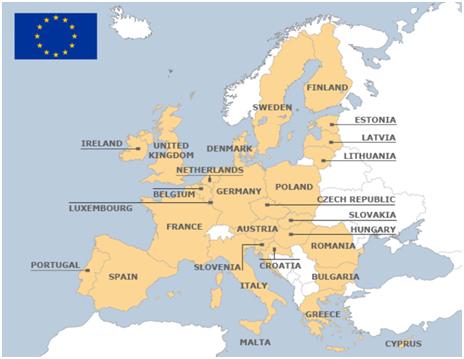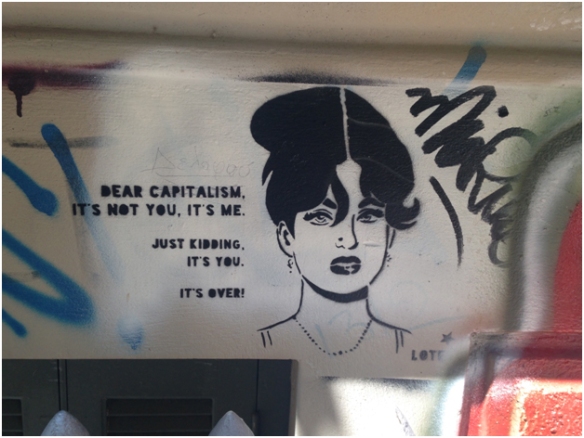You are here
- Home
- Blog
- The Empire is Out With a Million Bullets Fired: a short introduction to the poetic rhetoric of harm
The Empire is Out With a Million Bullets Fired: a short introduction to the poetic rhetoric of harm

Source: BBC 2014
Poetry is the saying of the unconcealdness of what is.
Martin Heidegger (1971) Poetry, Language, Thought. NY: Harper Perennial, p.71.
In the recent past the demand for “taking back control” was at the core of pertinent political and economic debates. For instance, it was suggested that border –as well as economic– control was hijacked by European intervention (refer to the critique offered by Jacqueline Rose 2/7/2016). Subsequently, this demand was mobilised by consolidating identity claims about what it means to be a body, a group, a bordered entity. But in the recent past, destructive “nationalisms” have contributed to lethal harms knitted with politics of contingency and “a creed of (gregarious) uncertainty” (Goodrich, Douzinas & Hachamovitch, 1994, 9).
In this short article, the aim is to unravel how recent monumental political events have been reflected on and through poetry. New poetry is everywhere, observes everything, reports and pushes back against everything. Less for the purpose of enumeration and more of remembrance, transformation and resolution, in the following paragraph the powerful accounts of recent political events are explored to show how the key themes of feeling “manipulated”, “misled”, “nostalgic”, “angry” and “sad” came into being by enacting politics of reason and (un)truth. The second part turns to poetry as radical recognition, to explore how poetry cultivates reflective, projective and transformative production. While this extract is part of a wider project on Poetic Rhetoric and Harm, which focuses on poetic representations of the Greek economic crisis, here the focus shifts. From Brexit and the murder of MP Jo Cox to the Orlando killings and to the Greek economic crisis, poems anticipate the present mood and times of the new millennium. What follows offers a brief recollection of recent political events:
1. Jo Cox, a pro-immigration Labour MP was brutally murdered prior to the referendum on Britain’s status in the EU (El-Enany 19/6/2016).
2. “Breaking Point”: Farage’s controversial campaign poster depicting non-white refugees crossing the Croatia-Slovenia border in 2015, indeed, broke many points to the extent that it was reported to the Metropolitan Police. For once more, it harmfully conflated distinct legal and social terms such as “migrants” and “refugees” synecdochically aiming to create a persuasive rhetoric for expulsive desire and action (see previously Boukli & Renz 1/2/2016).
3. Pre-Brexit, specific Eastern countries were stigmatised as un-worthy recipients of EU funds (see e.g. Hall, 2/2/2016).
4. Post-Brexit racist and xenophobic cards were posted through letter boxes inciting racial hatred; a cultural center was vandalized with graffiti; protesters incited hatred through demands for stopping migration and starting deportations of (one can only assume) European citizens.
5. European colleagues and prominent academics were questioned by students about their right to live and work in the country. European citizens have been referred to by their employers as “non-UK” instead of “valued employees” or European.
6. Misleading comparisons have been made between the Greek referendum in 2015 and the British referendum in 2016, implying that both states have voted for a Grexit and a Brexit respectively. Conveniently this silences radical differences between the two referenda: the Greek referendum was asking people to decide on the “Reforms for the Completion of the Current Programme and Beyond”, suggested by the European Financial Stability Facility in the form of a loan facility agreement. As a result, the Greeks voted NO to the austerity politics, the intensification of privatisation, the acceleration of “open markets” and the cruel lending circuit proposed by the Master Financial Assistance Facility Agreement. The Greeks voted NO to this agreement, which led to the imposition of capital controls and to subsequent negotiations of an imposed Grexit. In political terms, the Greeks cast an anti-austerity “NO” rather than an “exit from the EU” vote.
This list of events above is only partial. Endless amphibologies, aposiopeses, paradoxes, ironies, catachreses and rhetorical ambiguities weave the legality of the contingent (see Goodrich 1994). Similarly, the recent comments by European leaders describing Brexit as an “amicable” or “clean” “divorce” are further distorting legal and political facts (see e.g. Diekmann and Hoeren, 26/6/2016). These comments are distorting in the sense that they animate the fantasy of states as sentient subjects: loving each other, cheating on, and divorcing amicably. This is not to suggest that a Brexit is not possible. I merely intend to point to the toxic intricacies of a democratic referendum that was urging people to vote for a Brexit with no legal plan in place, in case of a successful leave campaign. A Brexit campaign that relied on dialectical disputations and on the fantasy of intensified border controls. While it ultimately fabricated the myths of the “British Refugee Crisis” and the “British Migration Crisis” (El-Enany 19/6/2016). A successful Brexit campaign that silenced the volatility of the post-9/11 political landscape and of what Brexit would factually mean for people; in other words, the “politics of reason” has always been a dimension of governance, utilised against all attempts to question the authority of established order.

Photographer: F.S. Renz, Greece Athens May 2016
I would like us to momentarily step into poetry in order to re-examine this contemporary list of creeping inconsistencies, xenophobic reverberations, murderous harms, and resistance as their poetic manifestations create new worlds.
Starting with a tone of European nostalgia, Glastonbury poem by Jodi Bickley reflects on the silent aftermath, on speechlessness, as the result of Brexit (see also Andrew Motion). Conveyed in imperfect rhyme, the poem suggests that Britain has lost a good “old friend” and it is opening up to the future with that loss. Others turn to social media [#WriteAPoemAboutBrexit] to convey internal rhymes. They make reference to a decision that is “abandoning humanity”; to being “brainwashed by the far right”; to bringing division and pain “[m]any wept / As reality sank in”; to being misled by personal political opportunistic agendas creating “Eton Mess”; to being manipulated by lies about immigration, which profit more “privatization” (Moran 26/6/2016). Scarcely, the other side of the polemic also spoke and instead used celebratory signifiers and made reference to a successful “break up” – “We’ve had our say, goodbye EU …hooray!” (Moore 26/6/2016).
Similarly, in the aftermath of the Orlando shootings poets turned to poetry to talk about harms linked directly or indirectly to the killings (#poetryfororlando). Poet laureate, Carol Ann Duffy, wrote the emotive poem “After Orlando: Gay Love”. In this Duffy urges us to see “gay” in a hypervisual and intersubjective form: “The writer is gay…/ The Farmer is gay…/ The politician is gay…/ The scientist is gay…/ The actress is gay…/ And God is gay”. Pointing to wider systemic harms, poet Joe Jimenez wrote the spearing poem Smutgrass:
“Growth is the hardest place for harm to lay its hair […]
All of it means this: not everyone has a phoenix
inside. Some of us growing beside
roads, among beer cans & ditch weeks, waste & trees
smothered with hunger, sightlessness, maladies. […]”
Amongst controversial and often divisive responses to the Orlando shootings and the staggering realisations of violence, these poems stay still like a persistent residue lingering when adversarial debates have been exhausted.
Lastly, turning to the Greek economic crisis, a polyphony of poets crystalise a revolt. In Greece, poetry is being written on walls, in public squares, theaters, empty lots, shopping centres or tattooed on bodies. Only recently, various edited collections transmit poetic representations of the Greek poetry and society as shaped by austerity (see for example, “Futures: poetry of the Greek crisis”, “Cross-Section: an anthology of contemporary Greek poetry”, and “Austerity Measures”). As a light seen through a convex mirror, the poems are “news bulletins from an undeclared war against the human condition” (Siotis, 2015, xi). The poems detect harmful messages and transform them into a mixture of volatile dimensions: they protest against crimes of capitalism, they rise up against planned misery and offer counter-narratives as substitute to the depression that ensues.
Poets construct allegories to describe the violent financial negotiations between the EU and Greece. For instance, poet Stavros Asteriou uses metaphors and the allegory of the train called “EUROPE”, with an “a-historic platform…/Inflicting pain upon the passengers as it turns […]/ Italians, Spanish, Irish, Portuguese, Greeks and others travel together/ and a river of despair is their destination.” Bearing witness to the hard lives led in Greece and the Balkans today, poets mock neoliberal responsibilisation and gendered security plans. Exemplary of this is the poem Ways to Avoid Sadness, by Anna Griva:
“Be careful where you tread […]
Be careful of your womb if you are women
of the Adam’s apple swelling your throat if you are men
and if you are still children find a way at last
to die painlessly without needing to appear
either men or women
Be careful of the danger that rises every morning […]”
In these times of “the danger that rises every morning”, can poetry light the spirit of revolution? Following Karl Marx, the social revolution of the twenty first century cannot take its poetry from the past but only from the future. Poetry, imagination and social revolution are entangled, stripping away all superstition against dogma and deceit. What poetry invites us to do, then, is to pause; to stop being absorbed in the production of wealth, in the “peaceful” competitive struggle; to question why our democratic vote is reduced to plans that are revealed to us only after we vote. Poetry invites us to question the divisions of our fragmented words by obtaining the inaccessible (Agamben, 1993). Poetry is here, is current, can change the future, and promises not to conceal.
Dr Avi Boukli, Lecturer in Criminology, The Open University
